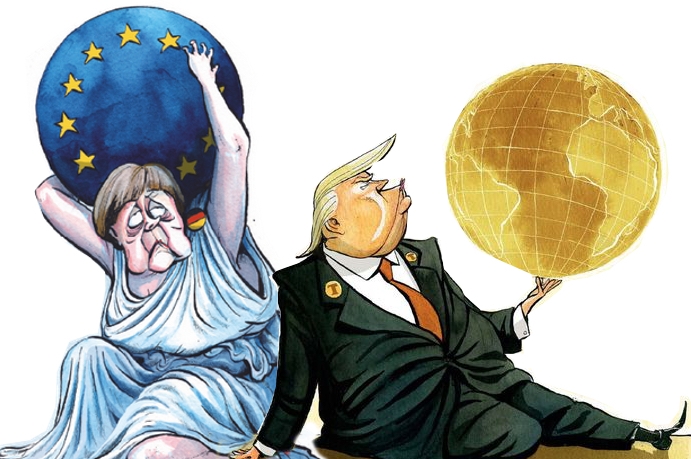The irresistible force meets the immovable object in Washington tomorrow, as Donald Trump finally comes face to face with Angela Merkel. It seems highly unlikely that they’ll emerge from this meeting holding hands. Not only do these two world leaders disagree about (almost) everything, their personalities could hardly be less compatible. Mrs May may simper that ‘opposites attract’ but Merkel, not May, is Trump’s polar opposite. There’s little prospect of any personal chemistry at the White House this time around.
But does this antipathy matter? Of course not. If anything, it’s a plus. In truth, the value of cordial relations between US presidents and foreign premiers is almost entirely confined to headline writers, for whom those photos of Trump and May walking hand in hand were merely an opportunity for a few corny puns. When it comes to actual policy, history tells us that how well world leaders get along is virtually irrelevant. Maggie and Ronnie may have got on like a house on fire, but how did that help us in Grenada or the Falklands? Tony Blair may have said a prayer with George W Bush, but how did that help us in Iraq? Like all playground bullies, Trump only respects boys (and girls) who stand up to him. Merkel will tell him how things stand tomorrow, and their meeting will be tense and awkward. And consequently both countries will come away with a much clearer idea of the best way ahead.
However just because Mrs Merkel will be blunt, that doesn’t mean there’ll be any fireworks. For the headline writers tomorrow’s meeting looks destined to be a damp squib. Unlike Trump, Merkel doesn’t go in for soundbites. Unlike Trump, most of her politicking takes places behind closed doors. Since she became Chancellor, twelve years ago, the memorable things she’s said can be counted on the fingers of one hand. And far from damaging her prospects, this stodgy presentation style has served her very well.
In Germany, Merkel is renowned for playing a waiting game. Each time a crisis blows up, she sits tight and says as little as possible, and waits for the sound and fury to die down. The one time she abandoned this strategy was during the refugee crisis, and it’s no coincidence that it was this crisis which damaged her the most. For Merkel, Trump’s election found her on far firmer ground. Her pithy welcome was a masterpiece of understatement: ‘Germany and America are connected by values of democracy, freedom and respect for the law and the dignity of man, independent of origin, skin colour, religion, gender, sexual orientation or political views – I offer the next President of the United States close cooperation on the basis of these values.’
But will the US continue its ‘close cooperation’ with Germany under Trump? Economically, of course it will. Trump’s protectionist posturing ignores the intricacies of modern trade, an interconnected world whose manufacturers are multinational (even American cars made in America are built from parts made overseas). The idea that we should retreat to our own log cabins and make all the things we needs ourselves may play well on the campaign trail, but it has had no relation to reality since Adam Smith wrote The Wealth of Nations. Foreign policy is another matter. Here Merkel’s experience of talking tough to President Putin (in fluent Russian) should stand her in good stead.
With the next national elections now just six months away, back in Germany Merkel’s reelection looks increasingly likely. If she’d faced the voters a year earlier, at the height of the refugee crisis, she would have been finished, but while this problem hasn’t gone away, it’s inevitably drifted off the front pages, and the anger that fuelled last year’s upsurge in support for Alternative fur Deutschland has curdled into discontent. For Germans, Merkel is the devil they know, and while there’s scant enthusiasm for her here in Germany, there’s a sense of inevitability about her prospects. New SPD candidate Martin Schulz looks set to get a strong showing, but he may actually help her by taking protest votes from AfD. Germany’s cautious system of proportional representation (installed by the Allies, to frustrate future demagogues) will do the rest. Another grand coalition between the SPD and Merkel’s CDU looks most likely, with Merkel back as Chancellor and Schulz in a new leading role.
Meanwhile, as the Trump presidency rumbles on, like a spoilt toddler up past its bedtime, Britons as well as Germans should be thankful for Merkel’s frumpy presence in the White House tomorrow. In public she presents a down-to-earth, dowdy figure, but this is the way the Germans like her. After the traumas of the last century, they’ve had quite enough of charismatic leaders. Merkel is dull, dreary and reassuringly dependable – a welcome contrast to that fractious man-child, the 45th President of the United States.






Comments